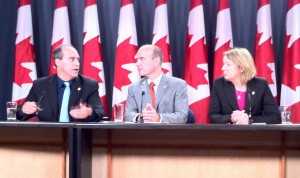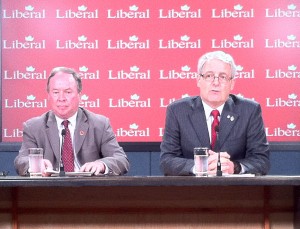
With the omnibus budget bill now passed Second Reading, the NDP summoned the media to the National Press Theatre to discuss their plans going forward. Those plans include getting public input by holding town hall-style hearings outside of Ottawa, and through an “unprecedented” social media campaign which includes a websiteand the hashtag #HarperBudget.
The website is a single page, whose most predominant feature is the comment box at the centre for Canadians to give their input on the omnibus budget bill. The box to the side calls it a “Trojan Horse” bill – which it’s not – and there are five pop-up boxes at the bottom, under headings like “the environment” or “healthcare” that each have four or five bullet points about provisions in the bill. It’s not comprehensive, it doesn’t cover a number of things in the bill that are equally troubling (like dismantling the Inspector General’s office at CSIS). When Peggy Nash said they would be “shining a light” and “deconstructing” the bill, this is a fairly superficial attempt at doing so.
I asked Cullen why it took so long for them to reach this stage of engaging the public if this bill was a “fundamental fight” for the NDP.
“Our initial phase was our hand extended to the government, saying work with us, divide the bill so that we can actually understand what’s in the bill – so that Canadians can understand what’s in the bill,” Cullen said. “We spent many days in earnest negotiations with the government, trying to get them to see the reason.”
He went on to talk about how many front-bench Conservative ministers have previous decried omnibus bills in the past.
“That was our first stage,” he said. “We didn’t want to move to any other delays, tactics or public consultation if we thought that we could satisfy those needs within parliament. This is the second phase. The government refused our offer, and we’ve moved onto the next stage. It’s what we believe in as New Democrats.”
Cullen says that if they don’t oppose an unprecedented omnibus bill like this, it will set a precedent for future governments – not that the NDP would rule out omnibus bills of any sort if they were to ever form government, he later clarified under other questions.
When asked why they aren’t holding any of these meetings in Alberta, despite the fact that the environmental changes would certainly be felt there (the hearings are planned for Halifax, Montreal, Toronto, Regina and Vancouver), Cullen insisted this was still the “first phase,” which makes one wonder if he believes they have an unlimited clock with which to stir public sentiment.
But when asked what they could do to “sex up” the issue so that it wasn’t just dismissed as a procedural battle, Cullen laid it out.
“Pensioners will lose $12,000 – that’s a fact,” Cullen said. “Environmental protections in this country will be eliminated. The government is going to concentrate power to such an extent that we’ve never seen before in this country. The Auditor General [office] will lose their ability to have oversight over a significant number of groups. Our spy agency is going to fundamentally change. These are things that Canadians do want to know about.”
Right – so why aren’t they talking about it like this? Because they haven’t been, and that might be more effective messaging than just crying about the government not playing fair, even if they do want to try to demonstrate “how Parliament should act” (though they seem to be forgetting that it’s the government’s job to propose and the oppositions job to oppose, and not the other way around).
Minutes later, Liberal House Leader Marc Garneau and Senator Jim Munson arrived to deliver their response. To a great degree, they panned the plan, saying that the NDP are treating social media as something new, and that they’ve already been engaged in such a campaign. The Liberal plan will involve their own social media strategy, along with the enhanced committee pre-study hearings that are now getting underway at the Senate, where they hope to have a more constructive effect and possibly even make changes. As well, they will reserve the right to use procedure to obstruct and delay if necessary to send a message. During the constituency week next week, they will also be spreading out across the country to hold meetings of their own (possibly under the moniker of “spRED”).
But Munson made a few salient points about the differences in strategy.
“We’re all using social media and we love using social media, and it is one way to connect with the public, but that kind of connection, if you’re tweeting, is in 140 characters,” Munson said. “I’d rather be having 140 witnesses in 140 hours of testimony in Senate committees. It seems to me that’s where you see the real character in this country, when real Canadians step forward to give their positions in a Senate committee, and I think it’s an opportunity, as Mr. Harper the dictator is trying to hide so much in this bill.”
The bill will be spread across six different Senate committees, though Munson indicated that it might also hit a seventh, for the aboriginal implications.
There was some discussion as to the irony that it was the unelected Senate that would be doing the heavy lifting on such a bill. “There once was a prime minister who said that MPs were nobodies off the Hill,” Munson said. “Well this prime minister is treating MPs as nobodies in their seats on the Hill. As Senators, we recognise that we’re in a minority in the Senate, but we do have a lot of people with expertise who can deal with these issues, and we really hope to hear good strong testimony so that we can propose amendments.”
When I asked if they would be taking the NDP up on their invitation that their town hall meetings would be inclusive, and show up with Liberal representation at them, Garneau indicated that he hoped that the grassroots membership would do so.
“I have to say at the same time that I’ve gone to my counterpart Nathan in the NDP and said that we’re very happy to work with you,” Garneau said. “Our offer hasn’t been taken up yet, but we are working for example with the Green Party, and we’re open to working as a team because in many ways, we all feel the same way in the opposition about this issue.”

